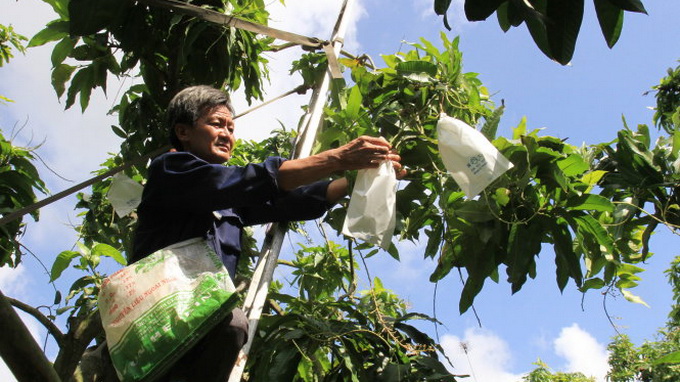Equipped with little more than a bamboo ladder and some ropes, these Vietnamese ‘Spider-Men’ work high up in the branches of mango trees to ensure the best quality mangoes reach consumers’ tables.
June marks the end of the mango season in Vietnam’s Mekong Delta, and owners of mango farms in the region are rushing to prune the branches of their trees to prepare for a new season.
At seven in the morning, a group of mango tenders arrive at a 16-year-old mango farm in Cao Lanh City, Dong Thap Province in the Mekong Delta region to prepare for their day of work.
Group leader Phan Van Tang Em speaks to his men briefly, “Kiet and Luc do this one. Xoai and Linh take that tall one over there. Hai, help me with the one next to that.”
A few minutes later, all six men have climbed to the top branches of their trees up to ten meters high, using their bare hands and feet with no safety line or helmet, and started cutting off the branches.
According to Em, the thicker the branches are, the fewer fruits the trees yield, so their job is to thin the branches and increase the farm’s productivity.
Around two hours later, drenched in sweat, each worker, still on top of their respective trees, leans against a branch for a quick rest before continuing their work.
“We usually try to finish one tree before climbing down for some water and then climb up another tree,” Em said. “When we’re too tired, we rest in the trees, since climbing down and up again takes a lot of time. That’s why people say we eat on the ground but work up high.”
Another group of workers led by Pham Tan Minh, 54, are wrapping mangoes in paper bags on the farm of Le Tran Nghia in the same city.
Nghia said when the mangoes grow as big as a human thumb, they must be wrapped one by one in paper bags to shield them from insects and pesticides, and help them maintain a smooth and shiny look on their skin for a higher market value.
According to Nghia, the mangoes are harvested 45 days after they are wrapped, and only wrapped mangoes are qualified for export.
Mango-wrapping is not a domain for careless workers, as even the tiniest scratch on the mangoes’ skin can grow into a big scar by the time of the harvest. Damaged mangoes are sold as cheaply as giving them away, Nghia said.
Bamboo ladders are used to reach higher-up mangoes, while workers use ropes to keep the ladders supported without having them lean against trees, a practice that farm owners usually forbid.
“Not all mangoes need to be wrapped,” Minh said. “The job of a mango tender is to determine which mangoes are qualified for further care, and which ones should be thrown away.”
“You need good health and a good heart to do this job, as you wouldn’t last if you don’t tend others’ mangoes like you take care of your own,” Minh added.

A mango tender works on the branches of mango trees. Photo: Tuoi Tre
Danger awaits
The first man to establish a mango-wrapping service in the province is Huynh Thanh Ba, an ex-deputy director of My Xuong Mango Cooperative in Cao Lanh District.
Ba said his cooperative was the first to implement the wrapping technique in mango tending around nine to ten years ago after taking advice from scientists at the time.
At first Ba said farm owners would only wrap mangoes that hung close to the ground, and he was the one who came up with the idea of using ladders to do the job up higher.
“It’s a dangerous job… I’ve seen some workers quit after a day out of fear of heights,” Ba said.
Phan Van Tang Em said he had worked many different jobs before committing himself to wrapping mangoes, “When I first took the job, my face turned pale and my hands and feet were shaking every time I climbed a tree, for I was afraid of falling.”
“I got more frightened seeing some of my co-workers almost falling due to broken branches. When I went home and told my wife about incidents, she cried and begged me to quit. But as time goes by, I’ve grown used to it and don’t feel scared anymore. You need to stay alert during rainy seasons however, as the branches are extra slippery, and a minor misstep can result in death,” Em said.
Other hazards that have become almost a daily expectation for these workers include getting stung by bees, receiving skin rashes from worms, and encountering poisonous snakes.
|
A trendy job According to Vo Viet Hung, director of My Xuong Mango Cooperative, mango tending is becoming a popular job in the Mekong Delta due to the enormous demand from farm owners. In addition, Hung said, importers of Vietnamese mangoes from such countries as Japan, South Korea, Russia, or New Zealand all require mangoes to be wrapped from a young age to guarantee food safety and esthetic quality. |
Like us on Facebook or follow us on Twitter to get the latest news about Vietnam!






















































